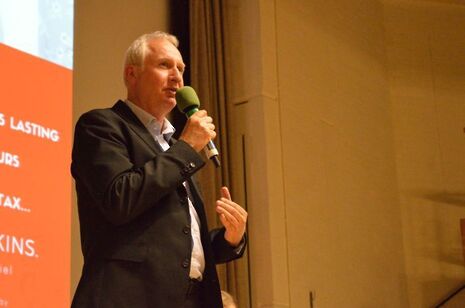Cambridge MP will vote against Brexit
Daniel Zeichner has reiterated his stance following the High Court ruling that parliament must be consulted on Brexit

The MP for Cambridge, Daniel Zeichner has reiterated his intention to vote against leaving the European Union in the wake of a High Court ruling on Thursday, that stipulated that the government must seek parliament’s support before triggering Article 50.
The government will seek to appeal the ruling to the Supreme Court, who are due to hear the case in December.
“It’s a curious idea that after a vote, you have to change your mind”, Zeichner told the BBC’s The World Tonight programme last night. “After general elections, I don’t notice people suddenly changing their view, so I will be entirely consistent.
“I may be in a minority, but I think it will be growing minority that will say if you’re going down the wrong path, the sensible thing to do is to think again”
The Labour MP, whose constituents voted overwhelmingly in favour of remaining in the EU by a margin of 74 per cent to 26 per cent, first voiced his intention to vote against the result of the national referendum in June, tweeting: “When the vote on the EU comes before Parliament, my vote will reflect the overwhelming result in Cambridge”.
Speaking to the BBC’s James Coomarasamy on Friday night, Zeichner repeatedly criticised the way the government’s approach to negotiating Brexit.
“At the moment we don’t even know what we’re going to be asked to vote on, so we’re going to need to see what the government brings forward”, he said. “Of course, the government should have done this right at the outset rather than wait to be dragged through the courts.”
Asked whether parliament had not already had its say on the matter, when it voted to put Britain’s EU membership to a referendum, Zeichner responded by stressing the unsatisfactory level of debate during the referendum campaign.
“I don’t think much was clear throughout the referendum actually”, he said, going on to reference the now widely-disparaged promise from the Vote Leave campaign that leaving the EU would result in an extra £350 million per week for the NHS, which he called “downright lies”.
He also argued that the potential adverse consequences of Brexit merit a reconsideration: “I think it’s entirely legitimate for those of us who think we’re taking the wrong path to say that and we’ll go on saying that and of course, it’s not just people like me that are saying that, it’s key people who lead many of our major industries warning about the dangers ahead”.
 News / SU reluctantly registers controversial women’s soc18 December 2025
News / SU reluctantly registers controversial women’s soc18 December 2025 Features / Should I stay or should I go? Cambridge students and alumni reflect on how their memories stay with them15 December 2025
Features / Should I stay or should I go? Cambridge students and alumni reflect on how their memories stay with them15 December 2025 News / Dons warn PM about Vet School closure16 December 2025
News / Dons warn PM about Vet School closure16 December 2025 News / Cambridge study finds students learn better with notes than AI13 December 2025
News / Cambridge study finds students learn better with notes than AI13 December 2025 News / Uni registers controversial new women’s society28 November 2025
News / Uni registers controversial new women’s society28 November 2025









